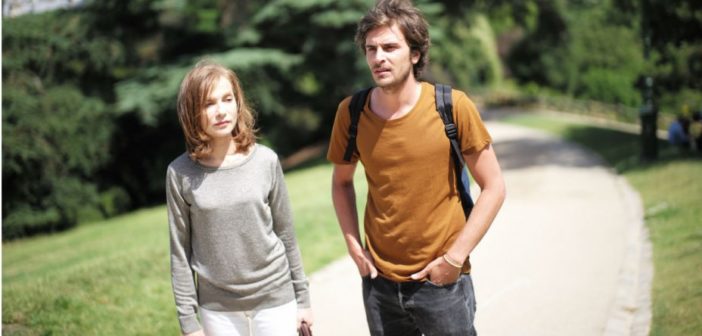The annual French Film festival, held throughout Australia and New Zealand, has just been extended with encore screenings until April 5 due to popular demand, and there was, as usual, plenty to choose from, with an increasing number of Belgian films. The stand-out film for me, and one I’ve been waiting to see for more than six months, was L’Avenir (Things to Come), Mia Hansen-Løve’s fourth film as a director, starring Isabelle Huppert as a philosophy teacher married with two grown-up children, who is suddenly dumped by her husband for another woman after twenty-five years of marriage, as well as facing her mother’s death and deciding what to do with her cat. By rights she should have got an Oscar nomination for this role rather than the sleazy Elle, which has finally been outed in the Guardian by one Bidisha as a ‘sick rape fantasy’ with ‘toxic gender politics’ provided by a male director, novelist, adapter, screen writer and producer, and bolstered by an army of predominantly male reviewers. Huppert of course dignifies and almost legitimises the role in Elle, but her performance in Things to Come, which won the Berlin Film Festival’s Silver Bear last year, is on another level entirely. But then of course it’s a foreign film, with subtitles, which makes it far too difficult for most US audiences, and its subject matter, which deals with publishing academic books, philosophical discussions, teaching and the like, also far too difficult for US audiences reared on Star Wars and its ilk.
The story is based on Hansen-Løve’s parents, who were both academics, and she brings a degree of perception to it that I found totally lacking from her previous film Eden, based on her brother’s experiences as a house DJ in Paris, even though the lead character, somewhat inexplicably, is from the US. Things to Come presents us with Nathalie, a woman in her fifties who is enamoured by a former student who has become an anarchist, moved to the country, listens to Woody Guthrie and has a girlfriend of his own age. She also loves her job, teaching philosophy to senior school students, and is always ready for a philosophical discussion, even debating the merits of Slavoj Žižek with her protégé. However, she is feeling her age, and being abandoned by her husband, who annoys her by leaving flowers for her and turning up at her apartment, is a hard blow to take. Her ex-student keeps asking her if she’s ‘met someone’, as if this is easy for a person in her fifties, and she is trying to keep track of her life which is slowly unravelling. It’s a thoroughly moving performance, head and shoulders above any of the Oscar nominees.
Huppert, actual age 63, was also the star of a pretty negligible Belgian-French-Luxembourg comedy, Souvenir, written and directed by Bavo Defurne, in which she plays Liliane, a former pop star reduced, rather improbably, to working in a pâté factory, a role she lends considerable dignity to, despite the slightness of the film – it was only screened twice in the festival, as if to underline its throwaway quality. She is recognised by a fellow worker, Jean, a rather drippy 22 year old boxer (Kevin Azais) in training for his first professional bout. Liliane spends her evening at home in her luxury apartment drinking aperitifis and watching TV quiz shows. The boxer’s parents were fans 30 years ago, when Liliane, performing as Laura almost won a European song contest, but lost to ABBA. They see a revival of this moment on television, and Kevin coaxes her into a comeback at the gym where he trains, where she sings the film’s title song and meets his parents. Liliane and Kevin, who is knocked out in his first professional bout, commence an affair, and Kevin decides to give up boxing to be Laura’s manager. This involves Liliane returning to her sleazy ex-husband/manager Tony (Johan Leysen) for new songs, and one of them is hilariously called ‘Joli Garçon’ (Pretty Boy) – ‘Arms of concrete/ I say yes/ Heart of candy/ I say yes’ – with the audience joining in on the chorus ‘I say yes’. She wins the European contest, but collapses in a drunken heap when she is awarded the prize. Laura’s performance style uses a kind of semaphore to underline the lyrics – music is provided by US lounge group Pink Martini – and the affair inevitably breaks down, with Kevin resuming his boxing and Liliane going back to the pâté factory. It’s a piece of fluff, really, but good fun – as the Guardian described it, ‘a soufflé that Huppert makes rise’.
Mia Hansen-Løve is of course currently married to Olivier Assayas, who gave her her first acting role at 17 in 1998, and is 26 years older than her, in the grand tradition of French patriarch politicians, writers and film makers. Although it wasn’t part of the festival, I can’t resist commenting on Assayas’ most recent film, Personal Shopper, written expressly for Hollywood actress Kristen Stewart, who was the first US actress to win a French César award for best supporting actress in Assayas’ previous film, The Clouds of Sils Maria, and commented that she found French cinema more stimulating than US cinema – a no brainer, really. Sils Maria pits Stewart opposite the formidable Juliette Binoche, to whom she plays a personal assistant, in designer glasses, trying to erase all traces of her past in the Twilight trilogy. The main problem is that, unlike far superior UK actresses like Charlotte Rampling, who has also worked with Assayaa, Jane Birkin and Kristin Scott-Thomas, she doesn’t appear to speak a word of French, and as Anthony Lane said of Sils Maria in the New Yorker, ‘almost the whole movie is in English, but we seem to be trapped inside a badly translated foreign novel, with no escape’. Having explored her bisexuality in that role, in what is quite a stimulating film about the theatre in some respects, she takes it further in Personal Shopper, which was made almost entirely in English – the ‘international’ trailer even has French subtitles – despite being set in Paris, and was salivated over by Peter Bradshaw, one of Elle’s main supporters, in the Guardian, who found Stewart ‘truly captivating’. Stewart plays another personal assistant, this time to a flighty fashion model (who is murdered in an almost inconsequential sub-plot) seeking to make psychic contact with her dead twin brother – they both grew up in an impossibly luxurious country house somewhere on the outskirts of Paris, so obviously qualify as over-privileged USians in Paris. According to Bradshaw, Stewart’s ‘naked body is periodically revealed in a context candidly free of sexuality. Yet she happens to look sensational in couture’. The only couture she appears in is in one scene in particular, in which Stewart illicitly tries on some bondage gear she has bought for her client, and then masturbates. I have to say the main thing that irritates me about Personal Shopper, a ghost story which is brilliantly filmed and has genuine moments of fright, and genuinely interesting sequences about the Dutch artist Hilma af Klimt, a spriritualist abstract impressionist ante litteram, and séances held by Victor Hugo, is that we hear almost no French spoken. Assayas has a long history of working with younger actresses, sometimes in English, but has never made a better film than Irma Vep, his 1996 film within a film remake of the Vampires with his then wife, Hong Kong actress Maggie Cheung.
Stewart has since gone on to direct her own short film, the 17 minute Come Swim, premiered at Sundance, about which she has even collaborated on a scientific article about its ‘neural style transfer’, published on Cornell University library’s open access website. Oh, and she has also written a cut-up poem, published in Marie Claire magazine in 2014. It’s called ‘My Heart is a Wiffle Ball/Freedom Pole’, and its first lines read: ‘I reared digital moonlight/You read its clock, scrawled neon/across that black’. More like piffle.
The Quebecois director Xavier Dolan is something of an enfant terrible in French cinema, and his latest, It’s Only the End of the World (Juste la fin du monde) a stage adaptation which inexplicably won last year’s Grand Jury Prize at the Cannes Film Festival, is a real family showdown with a stellar French cast. Filmed in Quebec, but mostly in close-ups or two shots, to disguise the setting, which is meant to be in rural France, it features a 32 year old and rather taciturn, if not decidedly bland, playwright, Louis (Gaspard Ulliel) visiting his family after an absence of 12 years. He is of course, gay, and dying of AIDS, but we have to read between the lines to find that out, as he never gets a chance to announce it. His mother (an almost unrecognisable and over-made up Nathalie Baye in a comical black wig), his sister-in-law (a gauche and earnest Marion Cotillard), whom he has never met previously, his boorish, aggressive brother, who won’t let anyone get a word in edgeways (Vincent Cassel), and his flighty, pot-smoking younger sister (La Seydoux), who seems to idolise him, indulge in endless bickering and snide comments which get no one anywhere. After a few claustrophobic encounters between two characters, Louis and his brother break out and go on a drive to get cigarettes, but the brother monsters Louis completely and again nothing gets said. Based on a play by Jean-Luc Lagarce, Dolan does just about everything from adaptation to costume supervision, editing, even supervising the English subtitles, but the result is mostly a lot of hot air.
The Belgian Dardanelle brothers have made a number of acclaimed and prize-winning films, but their latest, The Unknown Girl (La Fille inconnue) has had some dud reviews: Peter Bradshaw in the Guardian called it ‘a rare misfire’, while the UK Telegraph compared its ‘melodrama’ to the British TV hospital soap Casualty. It got a better response in the USA, where the directors, interviewed in the Guardian about Obamacare, said they hoped the film’s treatment of a caring healthcare system in Belgium would provide ‘a surprise’ – this was before Trump’s attempt to demolish Obamacare. I liked the film a lot, especially the very serious portrayal of the protagonist, Jenny, a fastidious doctor in her 20s (Adele Hyene, who won a César award), based in Seraing, a small town outside Liege. She instructs her intern not to answer the door when there is a ring on the doorbell one hour after they have finished their practice for the day, a decision she will regret. A visit from the police reveals that a young African prostitute has been murdered shortly after the ring at the doorbell, and Jenny sets about doing some investigating, using patient confidentiality as a way of extracting information. She has been offered a prestigious job in a practice in Liege, but decides not to take it, preferring to take over the practice of an aging colleague in Seraing, where she has built up a community of patients. She seems to always have time for them, however dreary and trivial their lives are, and accepts their offers of coffee, cakes and conversation, all in the interests of providing them with the best care. Her investigations lead her into the Liège underworld, where she is threatened by criminals, but she eventually finds the perpetrator close to home. It may not be the most exciting of stories, but Haenel’s performance is outstanding, and Jenny sense of duty phenomenal. She even convinces her intern, who has become disillusioned with medicine, to come back to the fold.
At the opposite end of the spectrum from Hollywood celebrities hijacking French cinema comes Mercenary (Mercenaire) the debut feature written and directed by Sacha Wolff, and premiered at the Quinzaine des Directeurs in Cannes last year. The film focuses on Soane Tokelau (Toki Pilioko), a non-professional actor from Wallis Island in the Pacific, a deeply Catholic island community not far from Tonga and Fiji, but under French jurisdiction, and accessible only by New Caledonian airways. Soane is a 19 year-old rugby prop built like a tree trunk and swathed in tattoos representing his family, a sight fairly familiar in this part of the world, who is given the chance to play rugby in France by a quasi-people smuggler, Abraham (Laurent Pakihivatau, a real life Wallisian rugby player), but is rejected at the airport as too light. He is only 111 kilos instead of the expected 140, and told to go back to Noumea by the French rugby agent. Prior to this he has had to suffer a savage beating from his tyrannical, gun-toting tyrant of a father, Léoné, a fisherman (Petelo Sealeu), who burns Sione’s belongings but still provides a farewell ceremony from his homeland before ordering him off his land. Sione has no option but to stay in France, dressed only in shorts and a yellow singlet, but luckily has been given the address of a compatriot in the South-West, where he joins a small-town rugby team in a ‘shithole’ called Fumel, where anti-doping tests are faked, ‘magic pills’ provided, and violent play encouraged. He is provided with lodgings, a job as a bouncer in the local night club, aptly named Golgotha, and a minimal salary by the club, which is soon cut off when it goes under. In a shower scene, Sione’s team mates, mistaking him for a Māori, demand a haka from him, but he refuses to oblige, as he is a French national, and speaks the language fluently, as well as Wallisian, a Pacific Island language with similarities to Samoan and Tongan.
A Georgian team mate, who provides the term ‘mercenary’, and chooses to go on strike when the salaries dry up, is one of his few friends, through whom he meets Coralie (Iliana Zabeth), the local bike, a checkout chick who refers to herself as ‘the fatty everyone fucks’, but whom Sione marries, thinking she is pregnant with his child. His rugby contact from home (Mikaele Tuugahala, another dreadlocked Wallisian rugby player in real life), who is reaching retirement age, suggests he replace him in a more prestigious provincial team, but Abraham tracks him down, demanding his air fare back, and inflicting him with another beating. As a result, Coralie leaves him. Sione does a deal with the Fumel rugby club for a portion of his transfer fee, after he has done a haka at half time, invoking the South Sea wind and the Tokelau Islands, and played a blinder of a second half. He also extorts more money in the Golgtha toilet from a jealous and wealthy team-mate who has tried to run him down in his mother’s car. He then sets off to Lourdes, where Abraham is, rather ironically, having a tattoo done of the Virgin Mary, and pays him back his money as well as forcibly demanding his freedom. He then sets off back home to Wallis, confronts his father, and rescues his younger brother from quasi-slavery.
Full of close-ups from cinematographer Samuel Lahu, Sione features prominently, and often silently, in almost every scene, being described as a ‘teddy bear’ by one French local who photographs his young son with him. The finale features Léoné’s funeral, and another spectacular haka, led by Sione, followed by gorgeous ukele-accompanied Pacific Island choral music. There’s also a three-legged dog called Elvis. It’s a delightful film, especially if you’re a rugby fan like me, and shines a light on a corner of the world I never knew about. It is only to be hoped that the Wallisian actors don’t get snaffled up to play mercenary Hollywood heavies, like a number of their Māori and Pasifikan colleagues have. Wolff graduated from La Fémis, France’s leading film school, a contemporary of Deniz Gamze Ergüven, the female director of the brilliant Turkish film Mustang, winner of the audience award at last year’s Sydney film festival, so expect great things from both of them in the future.
You can find out about the French Film Festival here.




